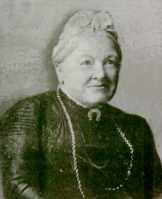Biographies Catherine Helen Spence

born on October 31, 1825, in Melrose, Scotland
died on April 3, 1910, in Norwood, South Australia
Australian author, reformer, feminist, and preacher
200th birthday on October 31, 2025
Biography
Her life's work was impressive, and she was called “The Grand Old Woman of Australia” – yet Catherine Helen Spence fell into oblivion. According to Dale Spender and others dedicated to researching historically significant women, this was completely unjustified: Spence was a pioneer in several fields.
In literature, Clara Morison: A Tale of South Australia During the Gold Fever (1854) was the first novel about Australia to be written by a woman. That it had been written by a woman only became clear ten years after its publication when Spence abandoned the pseudonym “a Colonist of 1839.” She wrote many short stories and six novels, one of which aroused particular curiosity after the Sydney Mail decried Handfasted as “too socialist and therefore dangerous” and accused its author of being intent on “loosening the bonds of marriage”! Long before Charlotte Perkins Gilman, she had imagined a feminist utopia that included trial marriages, more education for girls than for boys, social and professional privileges for the orphaned and the unwanted children, and much more. However, as one character in Handfasted laments at the end of the novel, real society was far from even imagining such a thing. Having no contact with the literary scene and little hope of matching the aesthetic achievements of her admired George Eliot, Spence increasingly turned to other genres. Her essays and reviews were featured regularly in various magazines and provided the income that she desperately needed: over the course of her life, she raised three generations of orphans on her own.
She was the first woman on the Ministry of Education's advisory board, and her groundbreaking monograph The Laws We Live Under (1880) was the first social studies textbook used in Australian schools. Her writings and her activism testify to a keen social and political awareness: she was committed to finding family homes for orphans and neglected children, caring for former juvenile offenders, establishing kindergartens and secondary schools for girls, improving working conditions for textile workers, reforming the electoral system, advocating for women's suffrage, and providing better educational opportunities for women.
Her growing success led to more engagements, and she became an extraordinarily talented speaker – speaking with the Scottish accent she had retained ever since arriving with her family in Australia at the age of 14. She was the first woman to lecture at the South Australian Institute. After freeing herself of the repressive Calvinist faith, she began preaching for the Unitarian Church, which had already become a forum for progressive ideas – she noted that the preaching made her feel “more cheerful.” In 1893, Spence was sent to the World Exposition in Chicago as a delegate for several organizations and gave five lectures. The international networking in the “Women's Building” there allowed her to pursue her feminist goals.
Her manner – direct, natural, and at times brusque – as well as the astonishing breadth of her knowledge as a self-taught woman aroused fascination and enthusiasm in audiences in the United States, Great Britain, and Switzerland during subsequent lecture tours.
In the field of politics, however, Spence was only partially successful. Although she was the first woman candidate for the Federal Convention in 1897, she was unfortunately not elected.
But her drive remained unbroken. When she died at the age of 84, she was regarded as an example of how women could overcome traditional barriers of gender and class on the young continent of Australia.
Given that one dissertation lists 1614 publications by Catherine Spence, it appears that “a new assessment of her contribution as a writer and author” is more than warranted.
(Text from 1999; translated with DeepL.com; edited by Ramona Fararo, 2025.
Please consult the German version for additional information, pictures, sources, videos, and bibliography.)
Author: Marion Kremer
Quotes
A tip for all women on how to succeed, from the mouth of the protagonist Clara Morison when she is offered a job: “I want to do anything that isn't ladylike, and I'll learn to do it right away, of course.”
A comment on the colonization of the United States: “…the Pilgrim Fathers ignored the right of the Pilgrim Mothers to the credit of founding of the American states – although these women had to take their full share of the toils and hardships and perils of pioneer and frontier life, and had in addition to put up with the Pilgrim Fathers themselves.” (autobiography)
On original sin: “there was no getting away from the feeling that the world was under a curse ever since that unlucky apple-eating in the garden of Eden. Why, oh! why had not the sentence of death been carried out at once and a new start made with more prudent people?” (autobiography)
If you hold the rights to one or more of the images on this page and object to its/their appearance here, please contact Fembio.



